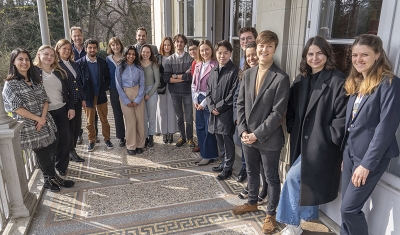Luke Moffett
18 June 2019
In an expert meeting organized at the Geneva Academy by the School of Law at Queen’s University Belfast, more than 30 academics and practitioners from a range of backgrounds and institutions from around the world discussed reparations by non-state armed groups during and following armed conflicts.
‘This meeting aimed at sharing our preliminary findings on reparations and non-state armed groups from fieldwork in Uganda, Peru, Colombia, Northern Ireland, Nepal, South Sudan and Guatemala’ explains Luke Moffett, Senior Lecturer at Queen's University Belfast.
‘It was our pleasure to run our workshop in the historic Villa Moynier, which provided the conducive space to work with the academics of the Geneva Academy and others on this significant but sensitive issue’ he adds.
Participants discussed how reparations by non-state armed groups might operate in practice during and following a conflict, what role apologies by non-state armed groups can play in providing symbolic reparations to victims, as well as the issue of humanising combatants, including their social reintegration.
‘As most armed conflicts are, today, non-international armed conflicts involving armed groups, the questions of reparations by these actors is a major issue for transitional justice’ underlines Frank Haldemann, former Co-Director of our MAS in Transitional Justice, Human Rights and the Rule of Law (MTJ).
‘The research project addresses a largely neglected topic of central practical relevance, challenging many current assumptions in the field, and is therefore welcomed’, adds Thomas Unger, former Co-Director of our MTJ.
The research team at Queen’s University Belfast will build on these discussions and their research to produce in early 2020 a handbook for humanitarian organizations to engage non-state armed groups on reparations.
 News
News
Geneva Academy
Our latest spot report explores how the targeting of water infrastructure is contributing to what is now considered the world’s largest humanitarian crisis, affecting 30 million people.
 News
News
The Geneva Academy has launched a practice-oriented course designed to equip our Master of Advanced Studies students with skills in open-source research and legal analysis under international humanitarian law.
 Training
Training
UN Photo / Jean-Marc Ferré
This training course will explore the origin and evolution of the Universal Periodic Review (UPR) and its functioning in Geneva and will focus on the nature of implementation of the UPR recommendations at the national level.
Adobe
This initiative wishes to contribute to better and more coordinated implementation, reporting and follow-up of international human rights recommendations through a global study on digital human rights tracking tools and databases.
 Project
Project
Adobe Stock
This project addresses the human rights implications stemming from the development of neurotechnology for commercial, non-therapeutic ends, and is based on a partnership between the Geneva Academy, the Geneva University Neurocentre and the UN Human Rights Council Advisory Committee.
 Publication
Publication